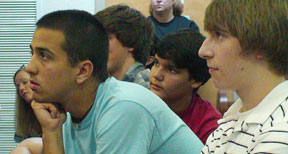
CHAPIN—Tim Staples does not mince words. 
The apologist for Catholic Answers told a crowd of more than 300 people at Our Lady of the Lake Church there are five non-negotiables that no true Catholic can support at any time during political elections: abortion, euthanasia, embryonic stem cell research, cloning and same-sex marriage.
His Sept. 21 talk wrapped up a three-day series that drew more than 1,000 to the Chapin parish. His presentations fanned the flames to excite families about their faith.
While the non-negotiables talk drew a crowd of all ages, he said the material was mainly geared toward adults of voting age.
Staples said when it comes to politics, Catholics must never vote for candidates who support the five non-negotiables because they go against the church’s core teachings about the sanctity of life and the value of the family to society. He said many other issues are non-negotiable according to church teaching, such as pornography or contraception, but the five he discussed were crucial because they are in play in today’s politics.
He said the sanctity of life is a core value in Christianity itself, not just in the Catholic Church.
“The 10 commandments are not a Catholic-only club,” he said.
One of the biggest misconceptions Catholics have when deciding how to vote is thinking that church teaching guides them to follow their conscience, he said. That works only if a person’s conscience is fully formed through good catechesis.
“We have to follow a well-formed conscience,” he said. “Our conscience can become malformed because of error or ignorance. Huge evils are committed out of ignorance.”
Staples said one of the main questions he hears is how Catholics should determine which candidate to vote for when it comes to pro-life issues.
He offered several examples of how the magisterium and recent teachings by Pope Benedict XVI show how to make decisions at the polls.
The best choice is always to vote for a candidate who stands for life, he said.
In the case where one candidate’s stance is more pro-life than the other, Staples said Catholics could use a guideline called incremental voting, which allows them to support a candidate who favors an incremental means toward eliminating abortion.
“If you have two candidates, and one is more pro-life than the other, vote for the one who would cause the least amount of harm,” he said. “In that case, you are not voting for evil.”
The only time it would be justifiable to vote for a pro-choice candidate over a pro-life candidate is if there were proportionate moral reasons, Staples said. It would have to be an extreme moral situation — for example, if the pro-life candidate was someone who also supported extreme evils, like genocide or terrorism, he said.
During a question and answer session, several audience members asked about the non-negotiables, such as dealing with medical procedures in a way that corresponds to church teaching.
Staples said the most important thing to remember is that no medical action must directly result in the death of a human being, whether it’s a baby in the womb or a person who is incapacitated and in need of a feeding tube or other assistance.
“You never kill an innocent person to save somebody,” he said. “We have to understand a baby in the womb is an innocent … You can never do any medical procedure which directly causes the death of someone. That’s murder.”
It’s important for Catholics to educate themselves about the principle of double effect when dealing with the question of medical procedures, he said.
One woman asked how to teach her children what they need to know to stay strong in their faith despite threats from popular culture.
“We can help our children by helping ourselves, by taking seriously the obligation we have to learn, study and know our faith,” Staples said. “That’s an obligation we inherit by receiving the sacraments of initiation. Parents are the first catechists of their children … we have an obligation to teach ourselves so we can raise our kids right, and fortify them against the culture.”
